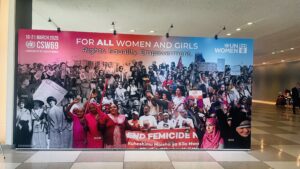Thirty Years On: A Critical Reckoning for Gender Justice

Thirty years after the adoption of the Beijing Declaration and Platform for Action, feminists from around the world converged in New York for the sixty-ninth session of the Commission on the Status of Women (CSW69), held from 10–21 March 2025. This was not just a moment to reflect on a historic milestone, but a critical time to take stock of the gains, the setbacks, and the shifting terrain for gender justice globally.
CSW as a Site of Feminist Strategy and Solidarity
The session focused on reviewing implementation of the Beijing Platform for Action—a document that remains one of the most ambitious, visionary blueprints for women’s rights. CSW is often a collision of worlds: grassroots organisers and movement leaders rub shoulders with diplomats, donors, and bureaucrats. But it’s also a vital space where feminist solidarity is rekindled, collective priorities sharpened, and political strategies debated.
Celebrating Gains, Confronting Realities
And yet, this year’s CSW felt bittersweet. While there was cause for celebration—the political reaffirmation of the Beijing Platform for Action, the powerful convening of feminists across generations—the broader context is troubling. Hard-won feminist gains are under attack. Sexual and reproductive health rights are being rolled back. Gender-based violence laws are being weakened or ignored. Space for feminist organising is closing in the face of rising authoritarianism and anti-rights agendas. Trans and queer communities are being criminalised and erased. Women human rights defenders face targeted harassment and violence. And economic policies continue to devalue women’s labour—especially in the informal and care economies—under the guise of post-pandemic recovery.
AWDF at CSW69: Political Presence and Purpose
In this context, AWDF’s presence at CSW69 was both strategic and urgent. Our focus was clear: to stand with our partners and movements, to amplify African feminist voices, and to push for sustained, flexible funding for women’s rights work—especially for those organising at the margins.
Resourcing Feminist Futures: A Call to Action
AWDF CEO Françoise Moudouthe opened the session with a powerful call for meaningful investment in gender justice. “We must immediately commit to protecting not just gender equality but gender justice for all—not with words, but with resources,” she declared. Her message resonated with urgency and clarity, calling on governments, international institutions, and philanthropic actors—especially those in the Global South—to back their commitments with real, sustained funding.
Strategic Convenings and Collective Visioning
Throughout CSW69, AWDF created spaces for strategic alignment and collective visioning. We hosted and co-hosted key events such as the Leading From the South (LFS) Collective Care event on Safeguarding Feminist Activism in Times of Polycrisis and a strategic meeting with the LFS Consortium. These spaces centred care, safety, and political strategy as feminist responses to a world in crisis.
Legacy, Leadership, and Intergenerational Dialogue
We also convened an intergenerational dialogue bringing together African feminists from across the continent and diaspora. The session explored legacy, mobilisation, and what it means to pass the baton without dropping it. As Bisi Adeleye-Fayemi reflected, “This is a movement. Intergenerational organising is about all of us being in the race, knowing we will be doing different things at different times, and playing different roles.”
Zeedah Meierhofer-Mangeli called for intentionality in passing on feminist knowledge: “Let us not leave it to coincidence—we must train, we must hand over, we must make legacy building deliberate.” Coumba Toure added her rallying voice: “Don’t wait for leadership to be handed to you. Take it. Push. Shift. That’s what the young have always done in this movement.”
Feminists on the Ground: Listening and Learning
Beyond panels and speeches, AWDF also took to the streets—with Warkha TV—to hear from everyday feminist activists. We listened, we learned, and we documented the power and plurality of feminist voices at this pivotal moment.
Movement Support in Practice
In line with our commitment to solidarity and movement support, AWDF enabled over 25 African feminist partners to attend CSW69. Partners like Nyaradzo Mashayamombe of Tag a Life International (TALI) and Anuli Aniebo of Heir Women Hub shared reflections on what it means for African women’s rights organisations to be present, visible, and resourced at global platforms like CSW.
The Road Ahead: From Commitments to Action
The session closed with a political declaration reaffirming the commitments made in Beijing, and calling for strengthened national systems, women’s machineries, and increased financing for gender equality. It was a reminder that while declarations matter, implementation—and resourcing—is what defines progress.
Moving Forward With Purpose
As AWDF, we leave CSW69 with sharper political clarity, deeper solidarity, and renewed urgency to fund, protect, and amplify the work of African feminists. The moment demands nothing less.
*Leading from the South (LFS) is a feminist funding initiative that supports women’s rights activism in the Global South through flexible, movement-led grantmaking. LFS is made up of African Women’s Development Fund (AWDF), FIMI – Indigenous Women’s Fund, Fondo Mujeres del Sur (FMS), and Women’s Fund Asia (WFA).
